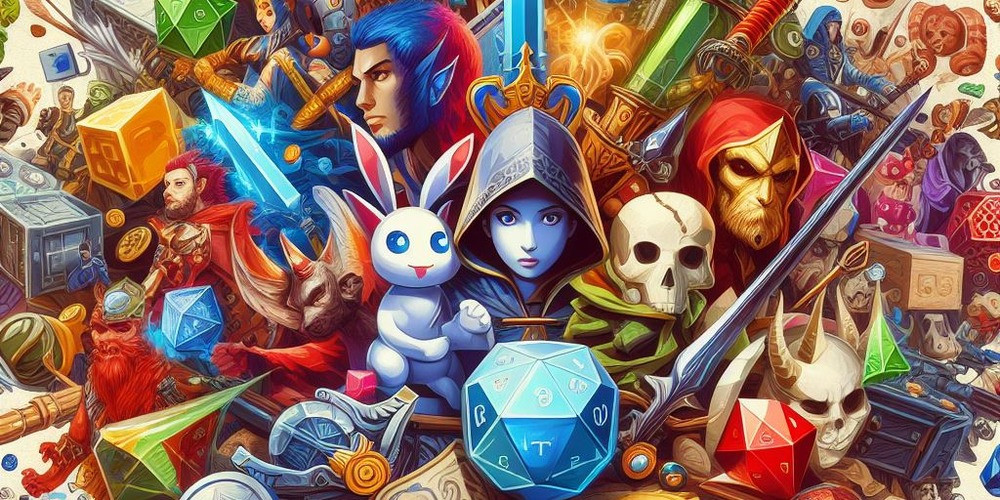Unlocking the Mind: The Intricate Psychology of Video Game Appeal

Gaming has evolved from a niche hobby to a mainstream cultural phenomenon, engaging millions of people worldwide. The allure of video games captivates individuals across various demographics, transcending age, gender, and background. But what exactly about these interactive experiences grips our attention so firmly? This piece examines the mental frameworks that explain why video games captivate so many of us. It investigates the complex aspects of human nature and the fundamental cravings that are fulfilled by the experiences offered in these virtual landscapes.
The Siren Call of Virtual Worlds

At their core, video games represent an escape, a portal to other realms where the shackles of reality are temporarily lifted. This escape provides not just a respite from the humdrum of daily life but also an opportunity to explore facets of our personality and capabilities in ways that the real world may not permit. The virtual landscapes we traverse in games are meticulously crafted to entice our senses, offering an immersion that can be both profound and personal.
Mastering the Self: The Drive for Competence
One of the fundamental psychological needs video games address is the desire for competence. As outlined in Self-Determination Theory, humans have an inherent drive to master tasks and face challenges. Video games excel at satisfying this craving by establishing definite objectives and offering immediate responses. The satisfaction of leveling up, improving skills, or defeating a particularly tough opponent taps into this intrinsic motivation, rewarding players for their effort and skill.
Charting the Unknown: Curiosity and Exploration

Curiosity is a powerful psychological force, and video games leverage this by creating worlds rich with secrets, stories, and possibilities. The joy of discovery keeps players engaged, driving them to explore every nook and cranny of the virtual space. This exploration can be both physical, as in wandering through vast digital landscapes, and intellectual, as in unraveling complex puzzles or plots. This dual avenue for discovery ensures that there is something for every type of explorer in the realm of video games.
Connecting the Pixels: Social Interaction and Community
Despite stereotypes of gamers as isolated, the truth is that video games can offer a profound sense of connection. Online multiplayer games and virtual communities serve as a medium for social engagement, satisfying our innate desire for connection with others. Whether it's a cooperative quest in an MMORPG or a competitive match in an arena shooter, games have a way of bringing people together, forging friendships and rivalries alike. This social fabric enriches the gaming experience, creating bonds that often extend beyond the screen.
Assuming the Mantle: Identity and Role-Playing

Video games often allow players to step into the shoes of another, whether it's a powerful hero, a cunning villain, or a character of their own creation. This aspect of role-playing serves a deeper psychological purpose, enabling individuals to experiment with their identity. In a virtual setting, one can explore different aspects of their personality, free from real-world repercussions. This can be a liberating experience, especially for those seeking an outlet for expression that they may not find in their everyday lives.
The Reward System: Dopamine and the Pleasure Principle
The human brain is wired to seek out activities that release dopamine, a neurotransmitter associated with pleasure and reward. Video games are structured to trigger this release, whether through the accomplishment of a goal, the acquisition of rare in-game items, or simply the thrill of the gameplay itself. This psychological reward system is a powerful motivator, often resulting in the 'just one more turn' or 'one more level' phenomenon that keeps players engaged for hours on end.
Flow and Focus: The Zone of Optimal Challenge

Psychologist Mihaly Csikszentmihalyi's concept of 'flow' describes a state of complete absorption in an activity, characterized by a perfect balance between skill and challenge. Video games are uniquely suited to inducing this state, with difficulty levels that adapt to the player's ability. When in flow, time seems to stand still, and the outside world fades away, resulting in an intensely satisfying experience that can be almost meditative.
The Power of Narrative: Stories and Emotional Engagement
A compelling story can be just as captivating in a video game as in a book or movie. Video games, however, offer an interactive dimension to storytelling, allowing players to influence the narrative and form a personal connection with the characters. This emotional engagement is intensified by the player's active role in the unfolding drama, often leading to a deeper investment in the story and its outcomes.
Overcoming Adversity: Resilience and Coping

Video games can also serve as a virtual training ground for resilience. The challenges and setbacks encountered within a game can teach players about perseverance and coping with frustration. Learning to overcome virtual obstacles can translate to a greater sense of confidence and problem-solving ability in the real world as players apply the lessons learned in-game to other aspects of their lives.
The love affair between humans and video games is complex and multifaceted, rooted in our most fundamental psychological needs and desires. From the drive for competence and the joy of exploration to the need for social interaction and the allure of narrative, video games offer a unique cocktail of stimuli that captivate the mind and soul. As technology advances and the medium continues to evolve, our understanding of the psychological appeal of video games will only deepen. One thing, however, is certain: video games have become a significant part of the human experience, providing more than just entertainment—they offer a playground for the psyche, where the limits of reality are stretched and the potential of the human spirit is explored.
Latest posts
See more-
![The Last of Us Part II: In-Depth Character Analysis and Storyline Exploration]() Editor’s Choice
2024-08-11
The Last of Us Part II: In-Depth Character Analysis and Storyline Exploration
The Last of Us Part II is an action-adventure video game that has gained significant popularity since its inception. Developed with immense creative prowess by...
Editor’s Choice
2024-08-11
The Last of Us Part II: In-Depth Character Analysis and Storyline Exploration
The Last of Us Part II is an action-adventure video game that has gained significant popularity since its inception. Developed with immense creative prowess by...
-
![CrossCode Developer Announces Alabaster Dawn, Enters Early Access in Late 2025]() News
2024-08-12
CrossCode Developer Announces Alabaster Dawn, Enters Early Access in Late 2025
In 2021, Radical Fish Games initially introduced a new action RPG titled Project Terra. Now, they have officially named it Alabaster Dawn and announced that...
News
2024-08-12
CrossCode Developer Announces Alabaster Dawn, Enters Early Access in Late 2025
In 2021, Radical Fish Games initially introduced a new action RPG titled Project Terra. Now, they have officially named it Alabaster Dawn and announced that...
-
![Alabaster Dawn Planned to Have 30-60 Hours of Playtime, Demo Launching in Early 2025]() News
2024-08-13
Alabaster Dawn Planned to Have 30-60 Hours of Playtime, Demo Launching in Early 2025
Radical Fish Games has made an exciting announcement regarding their upcoming action RPG, Alabaster Dawn, which is set to enter early access in 2025. In...
News
2024-08-13
Alabaster Dawn Planned to Have 30-60 Hours of Playtime, Demo Launching in Early 2025
Radical Fish Games has made an exciting announcement regarding their upcoming action RPG, Alabaster Dawn, which is set to enter early access in 2025. In...
Latest Reviews
See more-
![]() Action
Cult of the Lamb
Action
Cult of the Lamb
-
![]() Action
WILD HEARTS™
Action
WILD HEARTS™
-
![]() Casual
Gacha Club
Casual
Gacha Club
-
![]() Action
Call of Duty®: Warzone™ 2.0
Action
Call of Duty®: Warzone™ 2.0
-
![]() Action
Gacha Cute
Action
Gacha Cute
-
![]() Action
Cuphead - The Delicious Last Course
Action
Cuphead - The Delicious Last Course










